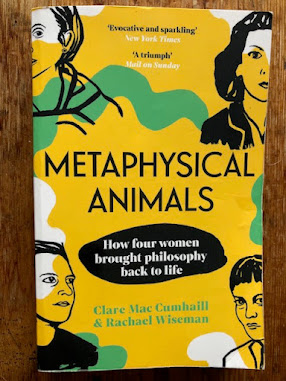Metaphysical Animals
We have just finished reading a marvellous book called Metaphysical Animals, which is about four British women philosophers who changed the direction of philosophy in the middle of the twentieth century. What has this got to do with Christian writing? I hear you ask. A lot, as you will learn if you read on.
The four women were called Mary Midgley, Philippa Foot, Elizabeth Anscombe, and Iris Murdoch. If you are an oldie, you may have heard of the last-named as a prolific novelist; you may even have read some of her novels. But she, like the other three, was also a formidable academic philosopher. Of the four, only Elizabeth Anscombe was a committed Christian (a Catholic in fact), but they were all definitely on the right side.
Up until the mid twentieth century, practically no philosopher doubted that (a) the metaphysical realm exists in some shape or form, and (b) moral or ethical principles have an objective reality. To simplify events enormously, in 1936 a young philosopher named A. J. Ayer published a book called Language, Truth, and Logic, which caused a sensation. His thesis was that only empirically verifiable statements have any validity. Therefore, (a) assertions about anything metaphysical, such as the soul, are nonsense, and (b) statements about right and wrong are merely emotional utterances, with the same validity as ‘hurray’ and ‘boo’.
Perhaps you can now see the significance of these ideas from a Christian point of view — and indeed, from the point of view of anyone of integrity.
Ayer’s views were taken up in centres of philosophical study such as Oxford and Cambridge with great excitement. He essentially destroyed philosophy as it had existed since Classical times. His views meant that philosophy could only study the way words are used, a project developed enthusiastically by such luminaries as A. J. Austin.
Our four female heroes all graduated and began their academic careers at just this time. By chance, the Second World War broke out soon afterwards, and the male academics were conscripted into the services, leaving the academic field open for the four women to begin the fight back. Mary Midgley later referred to their response as ‘a joint “No!”’ Each in her own way developed an approach to philosophy that brought it back from the world of abstraction into which the men were trying to consign it. They re-rooted it in the real experience of being human, where statements like ‘that was brave’, ‘I was ashamed’, ‘they were unkind’, and so on, are firmly accepted as conveying truths beyond our purely subjective feelings. And although the opposing ‘positivist’ school of philosophy was by no means eradicated, these women succeeded in making it respectable again to view human beings as ‘metaphysical animals’.
But surely, you ask, what goes on in erudite philosophy departments has little effect on the real world of nurses, van drivers, checkout staff, and estate agents? Don’t you believe it. Dons espousing pernicious doctrines about the subjectivity of morals lecture to large audiences; they appear on radio and television, and nowadays on YouTube and the many other web media; and they teach students, most of whom do not become academics, but lawyers, doctors, psychiatrists, civil servants, and, most significantly, politicians. The seeds sown by Ayer nearly ninety years ago have germinated in the hearts of three generations of the great and the good. The moral desert in which we now live is the result.
And the relevance to Christian Writers? Well, none, if we write the same sort of things as secular people but just happen to be Christian. But if we are called to write for Christ in some way, the relevance is clear. Somehow we have to use our words to challenge and refute the ethical confusion and darkness of our times, as Mary, Philippa, Elizabeth, and Iris did in theirs.

Surely the 4 women philosophers' views have also filtered through in the same manner, to combat the views of Ayer? They have to me, in that I read and loved Iris Murdoch, one of my favourite novelists after Susan Howatch.'The yearning for a spiritual outlook in a materialistic world' has been part of my life since early childhood. (Sheila)
ReplyDeleteThank you, though, for a very thought provoking post, and it is sobering for us to recognise the way ideas like this filtering through the different levels of our society can affect the thinking of the wider population. I studied the Philosophies of Mind, Religion, and Language at university and we did cover Ayer. I still remember my 'naive' shock during Philosophy seminars!(Sheila)
ReplyDeleteThanks, spot on comments!
ReplyDeleteWhat an interesting University course that sounds, Sheila! I can see where you're coming from - and of course their ideas have also filtered through - but Ayer was very influential in his day, he was (I think this is significant) a man, and those views - where ethics, integrity, and morality may be ditched for 'feelings' and 'one's own truth' are of course very seductive. Society has (does) prefer the exciting/the new/the easy as we can see from our human love of leisure, pleasure, and advertising...! Ayer fed people what they wanted I guess...(I have also read lots of Iris Murdoch - I wish I knew more about her philosophy side, but she seemed to love exploring magi-type heroes and certainly had some of her own.)
ReplyDeleteJust as Peter and Paul did in their time - writing for Christ! May we as Christian writers follow in their steps for the relevance and impact of our generation. Lovely post, Philologus. Thanks.
ReplyDelete